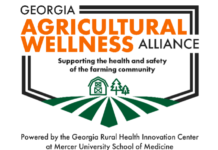MACON — Mercer University School of Medicine has been awarded a Rural Health Network Development Planning Grant from the federal Health Resources and Services Administration to fund the planning phase of their project, titled “SERVE Health Care: Enhancing Care Through Telehealth in Rural North Georgia.”
The goal of this grant is to strengthen rural community health interventions and enhance care coordination in the rural Georgia counties of Fannin, Gilmer, Gordon and Polk. The Health Resources and Services Administration is an agency of the U.S. Department of Health and Human Services, and its programs provide equitable health care to people who are geographically isolated and economically or medically vulnerable.
“Mercer University School of Medicine’s mission is to serve rural Georgia. This award allows us to continue this work in very important ways. Substance abuse is a major health concern and is especially so in rural areas,” said School of Medicine Dean Jean Sumner, M.D., FACP.
The SERVE Health Network — or Strengthening Essential Resources for Vital and Equitable Health Network — planning project builds on the efforts of the North Georgia Opioid Prevention and Education Network, which has been addressing critical opioid issues since 2019.
Spearheaded by School of Medicine employees Paula Kamara, M.P.H., Allen Tindol, M.D., and Sherrie Williams, L.C.S.W., the project proposes the establishment of telehealth hubs within local Recovery Community Organizations to better support residents of these counties as they seek recovery and treatment from substance use. These hubs will provide critical health care and mental health services remotely, thereby overcoming the barriers of distance and transportation that many rural residents face.
The project’s target area was selected because it includes four of the hardest hit counties in Georgia in terms of opioid overdose. According to the Centers for Disease Control and Prevention, this region exhibits a 36% higher overdose-related ER visit rate than the rest of the state, and 120% higher overdose-related emergency room visit rate than the rest of the nation.
“The number of cases of substance use disorder has increased progressively over the past decade, and the increase did not abate during the COVID-19 pandemic. On the contrary, as social distancing, isolation and seclusion led many substance use disorder sufferers to seek refuge in opioids and other drugs, the opioid epidemic worsened,” Dr. Tindol said. “Any means to improve contact and communication between persons confronting substance use disorder and those who can offer help will be beneficial, in normal times and in times of emergency, and especially in rural areas. In the communities in which it will function, for those Georgians combatting substance use disorder, and for their family members and friends, the SERVE Health Network will have a beneficial effect on substance use disorder prevention, treatment, and recovery.”
The grant of $99,994 will fund the planning phase of the SERVE Health Network, focusing on three primary goals to evaluate health care access, develop an implementation plan, and enhance rural health care system resilience. The project’s core mission is to significantly improve access to health care and mental health services through a sustainable network designed to meet the community’s specific needs.
Once implemented, this network will enhance care quality and access and offer employment opportunities, thereby strengthening the overall health infrastructure. Additionally, by involving School of Medicine medical and family therapy students, the project will support the development of skilled professionals who are well equipped to address the unique challenges of rural health care.
Partners supporting and actively engaging with this project include the Georgia Council for Recovery, Rivers of Peace Recovery Community Organization, The Arena Recovery Community Organization, Mosaic Place Recovery Community Organization, Highland Rivers Behavioral Health, and the Georgia Partnership for Telehealth.
About Mercer University School of Medicine (Macon, Savannah, Columbus, and Valdosta)
Mercer University’s School of Medicine was established in 1982 to educate physicians and health professionals to meet the primary care and health care needs of rural and medically underserved areas of Georgia. Today, more than 60% of graduates currently practice in the state of Georgia, and of those, more than 80% are practicing in rural or medically underserved areas of Georgia. Mercer medical students benefit from a problem-based medical education program that provides early patient care experiences. Such an academic environment fosters the early development of clinical problem solving and instills in each student an awareness of the place of the basic medical sciences in medical practice. The School opened additional four-year M.D. campuses in Savannah in 2008 and in Columbus in 2021, and a clinical campus in Valdosta in 2024. Following their second year, students participate in core clinical clerkships at the School’s primary teaching hospitals: Atrium Health Navicent/The Medical Center and Piedmont Macon Medical Center in Macon; Memorial Health University Medical Center in Savannah; Piedmont Columbus Regional Hospital and St. Francis Hospital in Columbus; and SGMC Health in Valdosta. The School also offers master’s degrees in preclinical sciences and family therapy and Ph.D.s in biomedical sciences and rural health sciences.










